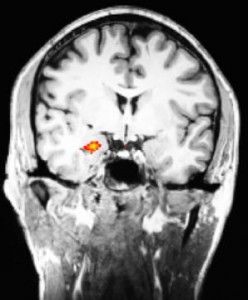10–12 hours of meditation training can improve daily-life emotional regulation
 Meditation Appears to Produce Enduring Changes in Emotional Processing in the Brain (Science Daily):
Meditation Appears to Produce Enduring Changes in Emotional Processing in the Brain (Science Daily):
“A new study has found that participating in an 8‑week meditation training program can have measurable effects on how the brain functions even when someone is not actively meditating…While neuroimaging studies have found that meditation training appeared to decrease activation of the amygdala — a structure at the base of the brain that is known to have a role in processing memory and emotion — those changes were only observed while study participants were meditating. The current study was designed to test the hypothesis that meditation training could also produce a generalized reduction in amygdala response to emotional stimuli…“We think these two forms of meditation cultivate different aspects of mind,” Desbordes explains. “Since compassion meditation is designed to enhance compassionate feelings, it makes sense that it could increase amygdala response to seeing people suffer. Increased amygdala activation was also correlated with decreased depression scores in the compassion meditation group, which suggests that having more compassion towards others may also be beneficial for oneself. Overall, these results are consistent with the overarching hypothesis that meditation may result in enduring, beneficial changes in brain function, especially in the area of emotional processing.”
Study: Effects of mindful-attention and compassion meditation training on amygdala response to emotional stimuli in an ordinary, non-meditative state (Frontiers in Human Neuroscience)
- Abstract: The amygdala has been repeatedly implicated in emotional processing of both positive and negative-valence stimuli. Previous studies suggest that the amygdala response to emotional stimuli is lower when the subject is in a meditative state of mindful-attention, both in beginner meditators after an 8‑week meditation intervention and in expert meditators. However, the longitudinal effects of meditation training on amygdala responses have not been reported when participants are in an ordinary, non-meditative state. In this study, we investigated how 8 weeks of training in meditation affects amygdala responses to emotional stimuli in subjects when in a non-meditative state. Healthy adults with no prior meditation experience took part in 8 weeks of either Mindful Attention Training (MAT), Cognitively-Based Compassion Training (CBCT; a program based on Tibetan Buddhist compassion meditation practices), or an active control intervention. Before and after the intervention, participants underwent an fMRI experiment during which they were presented images with positive, negative, and neutral emotional valences from the IAPS database while remaining in an ordinary, non-meditative state. Using a region-of-interest analysis, we found a longitudinal decrease in right amygdala activation in the Mindful Attention group in response to positive images, and in response to images of all valences overall. In the CBCT group, we found a trend increase in right amygdala response to negative images, which was significantly correlated with a decrease in depression score. No effects or trends were observed in the control group. This finding suggests that the effects of meditation training on emotional processing might transfer to non-meditative states. This is consistent with the hypothesis that meditation training may induce learning that is not stimulus- or task-specific, but process-specific, and thereby may result in enduring changes in mental function.
- Amount of meditation practice: The total reported duration of meditation practice in the MAT group was 645 ± 340 minutes (mean ± standard deviation, N = 12), ranging from 210 to 1491 minutes. In the CBCT group it was 454 ± 205 minutes (N = 12), ranging from 190 to 905 minutes.
- Meditation protocols: Mindful Attention Training (MAT), Cognitively-Based Compassion Training (CBCT)
To Learn More:


